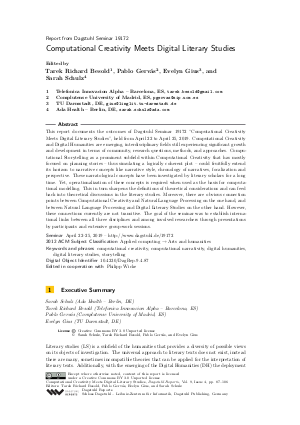Computational Creativity Meets Digital Literary Studies (Dagstuhl Seminar 19172)
Authors Tarek Richard Besold, Pablo Gervás, Evelyn Gius, Sarah Schulz and all authors of the abstracts in this report
-
Part of:
Issue:
Dagstuhl Reports, Volume 9, Issue 4
Part of: Volume: Dagstuhl Reports, Volume 9
Part of: Journal: Dagstuhl Reports (DagRep) - License:
 Creative Commons Attribution 3.0 Unported license
Creative Commons Attribution 3.0 Unported license
- Publication Date: 2019-09-30
File

PDF
DagRep.9.4.87.pdf
- Filesize: 8.48 MB
- 20 pages
Document Identifiers
Subject Classification
Keywords
- computational creativity
- computational narrativity
- digital humanities
- digital literary studies
- storytellin
Metrics
- Access Statistics
-
Total Accesses (updated on a weekly basis)
0Document
0Metadata
Abstract
This report documents the outcomes of Dagstuhl Seminar 19172 "Computational Creativity Meets Digital Literary Studies", held from April 22 to April 25, 2019. Computational Creativity and Digital Humanities are emerging, interdisciplinary fields still experiencing significant growth and development in terms of community, research questions, methods, and approaches. Computational Storytelling as a prominent subfield within Computational Creativity that has mostly focused on planning stories - thus simulating a logically coherent plot - could fruitfully extend its horizon to narrative concepts like narrative style, chronology of narratives, focalization and perspective. These narratological concepts have been investigated by literary scholars for a long time. Yet, operationalization of these concepts is required when used as the basis for computational modelling. This in turn sharpens the definitions of theoretical considerations and can feed back into theoretical discussions in the literary studies. Moreover, there are obvious connection points between Computational Creativity and Natural Language Processing on the one hand, and between Natural Language Processing and Digital Literary Studies on the other hand. However, these connections currently are not transitive. The goal of the seminar was to establish international links between all three disciplines and among involved researchers through presentations by participants and extensive group-work sessions.
Cite As Get BibTex
Tarek Richard Besold, Pablo Gervás, Evelyn Gius, and Sarah Schulz. Computational Creativity Meets Digital Literary Studies (Dagstuhl Seminar 19172). In Dagstuhl Reports, Volume 9, Issue 4, pp. 87-106, Schloss Dagstuhl – Leibniz-Zentrum für Informatik (2019)
https://doi.org/10.4230/DagRep.9.4.87
BibTex
@Article{besold_et_al:DagRep.9.4.87,
author = {Besold, Tarek Richard and Gerv\'{a}s, Pablo and Gius, Evelyn and Schulz, Sarah},
title = {{Computational Creativity Meets Digital Literary Studies (Dagstuhl Seminar 19172)}},
pages = {87--106},
journal = {Dagstuhl Reports},
ISSN = {2192-5283},
year = {2019},
volume = {9},
number = {4},
editor = {Besold, Tarek Richard and Gerv\'{a}s, Pablo and Gius, Evelyn and Schulz, Sarah},
publisher = {Schloss Dagstuhl -- Leibniz-Zentrum f{\"u}r Informatik},
address = {Dagstuhl, Germany},
URL = {https://drops.dagstuhl.de/entities/document/10.4230/DagRep.9.4.87},
URN = {urn:nbn:de:0030-drops-113054},
doi = {10.4230/DagRep.9.4.87},
annote = {Keywords: computational creativity, computational narrativity, digital humanities, digital literary studies, storytellin}
}
